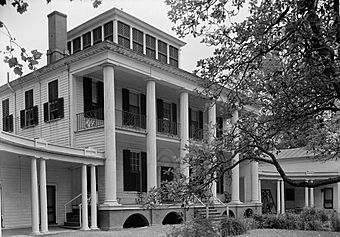Hayes Plantation facts for kids
|
Hayes Plantation
|
|

Hayes Plantation House, 1940 HABS photo
|
|
| Nearest city | Edenton, North Carolina |
|---|---|
| Area | 600 acres (240 ha) |
| Built | 1814–1817 |
| Architect | William Nichols, Sr. |
| Architectural style | Greek Revival, Federal |
| NRHP reference No. | 74001341 |
Quick facts for kids Significant dates |
|
| Added to NRHP | February 26, 1974 |
| Designated NHL | November 7, 1973 |
Hayes Plantation, also known as Hayes Farm, is a very old and important estate near Edenton, North Carolina. It was once owned by Samuel Johnston (1733–1816). He was a key figure in North Carolina's early history.
Samuel Johnston served as the Governor of North Carolina from 1787 to 1789. He also became one of the state's first two U.S. Senators. He served in the Senate from 1789 to 1793. Later, he worked as a judge until he retired in 1803. Samuel Johnston passed away in 1816. The main house at Hayes, which you see today, was finished by his son, James Cathcart Johnston, in 1817. Many other buildings on the property are even older than the main house. One of these is the Hayes Gatehouse, where James Johnston lived before the big house was built.
Contents
The History of Hayes Plantation
James Cathcart Johnston's Life
James Cathcart Johnston was known for not marrying. However, he played an important role in the lives of several young women. He supported their education and helped them financially. One of these young women was Annie Wood (1831–1879). She was raised by her relative, Edith Wood. Annie later moved to Salem, Massachusetts. There, she married John G. Webb. He was the grandson of Vice President Aaron Burr. James Cathcart Johnston made sure Annie Wood was well cared for.
Hayes After the Civil War
James C. Johnston passed away at the end of the American Civil War. He left Hayes Plantation to his friend and advisor, Edward Wood. Edward Wood and his family moved to Hayes. Members of the Wood family still live there today. Hayes is still a working farm. It grows many crops like cotton, tobacco, peanuts, and various grains. The Wood family has hosted many important events at the home. These include gatherings for the North Carolina Supreme Court and the North Carolina House of Representatives. Several governors and other important people have also visited.
The Main House at Hayes
The main house at Hayes is very special. Experts in architecture call it "one of the South's most accomplished examples of a five-part Palladian villa." It was designed by an English architect named William Nichols, Sr.. He was famous for his early Neoclassical buildings. He also designed statehouses for three Southern states.
Construction of the house started in 1814. It took three years to build and was finished in 1817. The main part of the house connects to other buildings by curved walkways. A wide belvedere sits on top of the central roof. The plantation house is privately owned. But it is so important that it was named a National Historic Landmark on November 7, 1973. It was also added to the National Register of Historic Places on February 26, 1974.
Hayes is located east of Edenton. It looks out over Edenton Bay to the south. To the north, it overlooks Queen Annes Creek.
The Johnston Family Cemetery
Just outside the main house is a small graveyard. It is called Johnston's cemetery. Many famous people are buried here. These include Penelope Barker, who led the Edenton Tea Party. Also buried here is James Iredell, who was a justice on the U.S. Supreme Court. Samuel Johnston, a former Governor of North Carolina, is also here. Another Governor, James Iredell, Jr., rests here too. James Wilson, who signed the Declaration of Independence, was once buried here. He was also a main author of the U.S. Constitution. However, his remains were moved in 1906 to Christ Church Philadelphia.
A Book About Hayes
In 2007, John G. Zehmer wrote a book about the plantation. It is called Hayes: The Plantation, Its People, and Their Papers. The book shares many old documents, photos, and memories. These come from members of the Wood family and others who know Hayes best.
Images for kids
 | Victor J. Glover |
 | Yvonne Cagle |
 | Jeanette Epps |
 | Bernard A. Harris Jr. |




